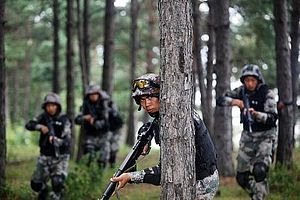Buried beneath the headlines this week was a rather intriguing geopolitical development: China’s People’s Liberation Army (PLA) will for the first time conduct joint military exercises in Australia. The announcement came as part of a four-day official visit to Australia by General Fan Changlong, the Vice Chairman of China’s Central Military Commission, following on from an earlier visit to China by Australia’s Minister for Defence, David Johnston.
According to the joint statement, China, Australia and the United States will take part in a land exercise called “Exercise Kowari” in Northern Australia in October this year. It will not only mark the first time Chinese forces train on Australian soil but also the first trilateral exercise between the three nations. Johnston hailed the agreement as an “important milestone” for trilateral defense cooperation. “Exercise Kowari,” he said, “is a firm demonstration of all three countries’ intent to work together towards enhancing mutual trust and regional stability.”
Although troop numbers have not yet been confirmed, it was reported that the military exercise could involve the Australian Army’s 1st Brigade, U.S. Marines rotating through Top End in the Northern Territory, and troops from the PLA’s Ground Forces. The aim is to practice survival techniques in the difficult and challenging terrain of the Australian outback. “The exercise will provide those taking part with an understanding of the basic principles, procedures, techniques and equipment that best support survival in a harsh environment,” Johnston said.
The exercises also provide a strong rebuttal to those analysts and commentators who fear closer military ties and strategic cooperation with the United States and Japan will inevitably come at the expense of Australia’s economic and trade relationship with China. As The Diplomat’s Shannon Tiezzi presciently noted earlier last month, Beijing’s reaction to the new Force Posture Agreement between Canberra and Washington was surprisingly positive compared with the initial announcement in 2011 of U.S. Marines being deployed to Darwin. Similarly, Abe’s recent visit to Australia in which he and Abbott signed a bilateral agreement on defense equipment and technology doesn’t seem to have caused any immediate damage to the relationship.
Although it’s important not to overstate the importance of a relatively small-scale military exercise amid the wider geopolitical uncertainty and strategic rivalry that still pervades the Asia-Pacific region, it is not insignificant to have China participating in joint military exercises with Australia and the United States. Following on from Beijing’s current involvement in the RIMPAC 2014 naval exercises, it also suggests that there may be more areas for mutual cooperation and confidence-building in the future.

































